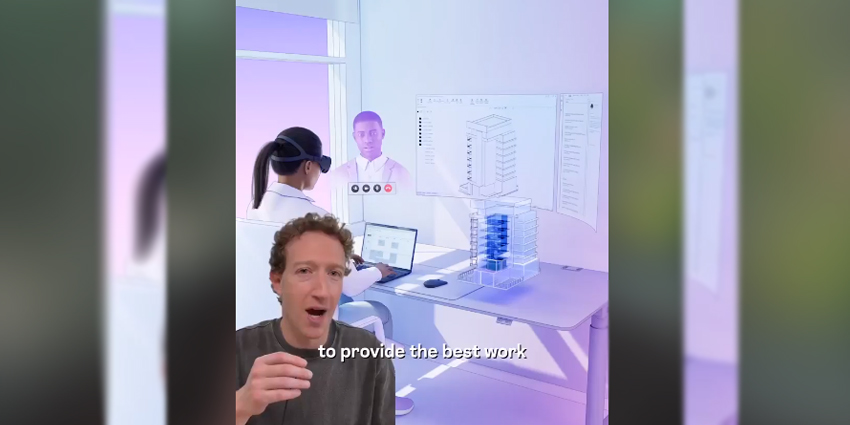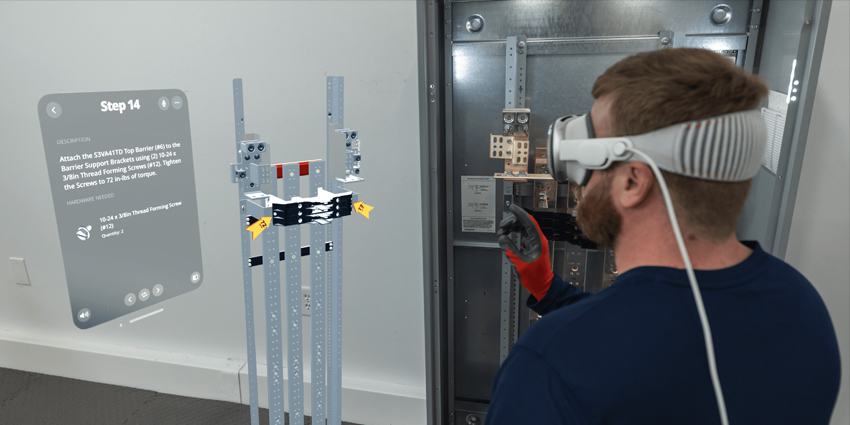In the last couple of years, extended reality, or “XR” has evolved from a novel concept into a crucial, disruptive technology for the future workplace. Between 2020 and 2026, MarketWatch predicts that global XR production will grow by 46.5% per year.
While several factors have undoubtedly contributed to the rise of XR, the pandemic was one of the industry’s biggest catalysts. Ever since the world faced the restrictions of social distancing and lockdown, we’ve begun to crave more immersive, meaningful experiences.
We’re also living in a “hybrid” world, where the future of work is less likely to involve the standard workplace office. Rather, we’re finding ways to collaborate globally using disruptive tools, and XR could be a big part of that. Virtual, mixed, and virtual reality allow us to reconnect and innovate from anywhere.
Demand for New Realities is Growing
One of the most popular articles on XRToday.com answers the question “How does virtual reality work?” Desire for this kind of content highlights the business world’s quest for knowledge in the extended reality space. All kinds of leaders are searching for insights into how extended reality technologies can help their businesses innovate and evolve.
As the world as we know it continues to evolve and respond to the changes of the last couple of years, companies know they need to connect with their audiences on new platforms. Conventional digital engagement landscapes are saturated; the future requires something more immersive. As a result, we’re seeing innovators search for new ways of redefining what XR can do.
Facebook has become “Meta”, with a focus on metaverse development, and the creation of a “new internet”. Oculus headsets are entering households and offices around the world. Facebook even introduced the world to Rayban-style smart glasses, which could be adopted by the masses as the next reality wearable for 2022.
Vendors are Sprouting from Everywhere
There are more competitors in the XR B2B world than most people realise. Lately, we’ve been reviewing almost all of the top XR business applications from across the world, and the options available continue to grow. The demand for extended reality is growing.
Our mission at XR Today is to help shift some of the awareness in XR to some of the smaller, innovative brands really making waves in this space. Indeed, we’ll be launching a dedicated Awards ceremony (XR Awards) in 2022 to help celebrate the efforts in the landscape.
From a hardware perspective, we’ve seen significant transformation too. New launches from players like Magic Leap, HTC Vive, and Meta/Facebook have begun to take the world by storm. The race for intelligent technology is on, and it will be interesting to see who comes out on top.
Meanwhile, enterprises are buying headsets and smart glasses at an incredible rate. I believe companies will continue to experiment with VR technology in the years to come. Just look at Accenture’s recent investment.
VR Collaboration and Hybrid Work
The use cases for extended reality technology are certainly growing as the tools for this landscape become more accessible. One particular area of interest is VR collaboration. Since the pandemic, Microsoft Teams and Zoom have led the 2D market for collaboration – but who will win VR?
Cisco is currently experimenting with the new Webex Hologram augmented reality solution for meetings. Elsewhere, Microsoft announced at Microsoft Ignite this year that it was baking extended reality into the market-leading Teams app. We can’t know for certain what the future will hold, but we do know there’s plenty of space in the market for exceptional growth.
This demand for collaborative VR environments is particularly significant now companies are embracing the benefits of hybrid work. Enabling both exceptional productivity and efficiency, hybrid work promises a cost-saving solution to the future of business management, and VR could be the key to keeping our in-office and remote staff connected. We can expect to see more immersive technologies adopted in the workplace during 2022 to support hybrid workers.
Even field service and front-line workers can benefit from extended reality. Mixed reality and augmented reality headsets can give field employees access to visual information instantly or offer hands-free guidance on tasks. As companies continue to search for greater efficiency among workers, there’s no doubt we’ll see more employees augmented by computers and XR solutions.
XR Events and Learning Opportunities
Collaboration and better workplace engagement solutions aren’t the only benefits of investing in XR for the future of work. There’s also a good chance we’ll see more extended reality in the event space too. Virtual events have gained massive attention in recent years, particularly since the pandemic made in-person interactions more difficult.
The Tokyo Olympics was a great example of how future events could bring extended reality into the hybrid events of the future. These VR-enabled events would certainly be more accessible on a global level and even a lot less expensive to both attend and run.
Additionally, the extended reality is beginning to play more of a role in the future of training and education. With virtual reality environments, users can step into dangerous locations and develop crucial muscle-memory skills, without the traditional risk. We can even build new, more immersive training opportunities for skilled professionals like doctors and surgeons.
The key to success in using XR for training will be to minimise the fatigue associated with extended reality training. For employees to spend more than 20 minutes in a VR headset, the visual experience needs to be more comfortable and less tiring.
Watch This Space
Ultimately, extended reality in the B2B and enterprise environments is finally here, and we’re seeing a new generation of technology transform our landscapes. The technology of tomorrow is being adopted faster than ever, and I expect to see this trend continue going forward.
However, we’ll all need to experiment as organisations if we want to get ahead of the competition. I expect other companies like Apple and Amazon will start to make their way into XR soon, and there are even rumours these companies may explore B2B, not just B2C.
While the mega technology brands fight for the top spot, it will also be interesting to see who offers the most open and accessible platform for developers and software vendors. A metaverse built by a single company is unlikely to survive in today’s world.
XR Today in 2022
If you’re keen to learn more about XR, check out our monthly focus topics starting in January, where we’ll explore the hottest trends and leading vendors:
Hot topics we’re focusing on in 2022 include:
- JAN – VR Headsets
- FEB – AR Smart Glasses
- MAR – Metaverse
- APR – NFTs
- MAY – XR Awards 2022
- JUN – Collaboration
- JUL – Eye and Hand Tracking
- AUG – Cyber Security and Privacy
- SEP – XR Summit 2022
- OCT – Spatial Audio
- NOV – XR Innovation Spotlight
- DEC – XR Trends Series
If you’re an XR vendor, request our new 2022 media kit to see our full programme of events and content opportunities for 2022.







